#anyways i remebered this article exists
Text
i wish more peeps knew abt this article from the Nintendo website :]

totally not bitter about it lol

that's...some unfortunate foreshadowing....

Louie. Louie no-

mmmMMMMMM Pikmin 3 would beg to differ

LOUIE NO-

wise words. so true King

THEY MEAN EVERYTHING TO ME <3
#pikmin#text post#captain olimar#olimar#louie#louie pikmin#'Musings of a Sidekick'#<- name of the article btw :]#love how Louie considers Olimar his very good friend yesyes#Louie's perceived friendship 🤝 Olimar's unwavering loyalty and protection for this troublemaker#their dynamic is so HGGFHDJDJKS#<3#anyways i remebered this article exists#and i had a great time re-reading it lol#i love how much personality they gave Louie here hehe#i just love when they give any character more personality in general :]
109 notes
·
View notes
Text
Tudor battles: Bosworth Field
Monday 22 August 1485 marks the beginning of Tudor era.
It was day of the last battle of War of Roses, and the first Tudor battle. We know how it ended. Richard III, last York died in this battle and Henry Tudor emerged victorious and became the first Tudor King, Henry VII.
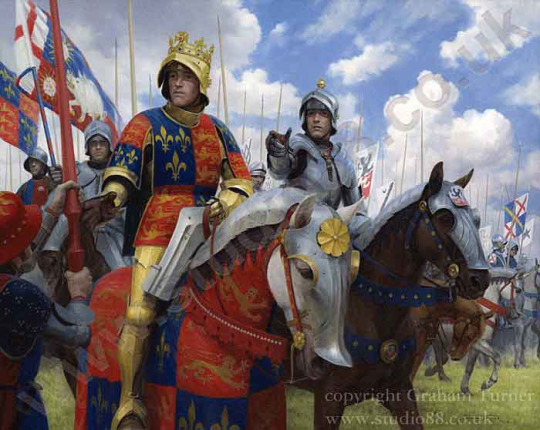
One could go for hours about politics and intrigue before and all that happened afterwards. We now know that battle happened South of town called Market Bosworth, not really close to it but the name Bosworth stuck.
But what has happened during the battle itself? I am no expert into historical battles, but I’ll try to explain anyway. So here is my ‘short’ view upon this battle:
Before going more about battle itself I wish to make some things clear about the two rivals:
It seems Henry VII was never before in battle(although he probably was trained in fighting as child despite being more or less hostage) and many years of his exile he was kept locked up in small room, not enjoying himself and not beeing able to train properly.
On other hand, Richard III was experienced and skilled warrior.
I strongly I recommend you watch documentary called King Richard III New Evidence of His Spinal Deformity, which you can find on Youtube. It gives great insight to how Richard’s scoliosis affected him as warrior.
Long story short-it didn’t prevent him from being good warrior and expert horse-man. In fact medieval saddle gave his back the support right where he needed, armour helped too.
But there is evidence he suffered from osteoarthritis where his scoliosis turned the most and that probably made him be in great deal of pain. Likely that is reason why during last 3 years of his reign he drank a lot of wine(+ beer which he drank even before)- and despite being very high status before, his diet as King became crazy overindulgence in delicatesies etc.
While we have remeber alcohol content back then was lower(still I don’t know if he still had hang of it or not) it it’s likely he was using wine and food as comfort for his pain.
Scientist think this big change to his diet might have effected him as warrior.
To my surprise Richard’s bones reveal him as somebody of much slender frame than I expected. Nimble on his feet and fast. But not for long time.
Richard’s scoliosis made Richard out of breath faster, to tire faster.
And imo this was one of the reasons why Richard decided to end Henry VII himself. He gave it all he had, knowing the battle would be long otherwise and that didn’t bode well for him. Unfortunately for him, he didn’t manage to kill his oponent.
There are many accounts of the battle.
I have used this article by English Heritage which has some of them in full:
https://historicengland.org.uk/content/docs/listing/battlefields/bosworth/
With interesting commentary and it points out that Vergil’s account(written in England in 1500s and 1510s) and Molinet’s from 1490s, matches in many aspects. Vergil’s just more dramatically written.
Spanish account is confusing, because it has lord Tamerlant which apparently didn’t exist.
(But given the non-unified spelling and source being Spanish it is possible it simply heavilly mispelled name.I tried to look for anything which would sound a bit like it, but can’t find it.
Afterthought: Sometimes lords were called by nicknames, some even more often than their actual titles. However i think another possibility is that it is lord of some Welsh place. Because sometimes when it comes to Welsh castles, the name in English is different than the one Welsh. For example Laugharne Castle, is in Welsh Castell Talacharn. Combined with non-universal spelling, it could then complenetely hide who it was.)
So it is probably not really trust-worthy and it is generally agreed by historions to be based upon hearsay Spanish merchants heard, rather than by somebody who actually was there.
And it in this account that Richard supposedly refused to flee saying 'God forbid I yield one step. This day I will die as a King or win'.
It is also Spanish account which says Henry Tudor saw Richard charging at him and refused to flee. So basically Spanish say-Nobody flee! We want epic battle! You fight it out!
I want that too, I am biased for epicness and logic.
And some of my theories about this battles are probably biased due to this.
But trust me, it is not at all a boring battle and screen as far I know, never gave it proper justice and some webpages are like-the commander was in back in safety! Meaning that person doesn’t know how battles worked, how commanders worked etc.
It is true that by 2nd half of 15th century, commanders often were at back, preferably uphill where they could see what was going on and would move their aditional troops to battle as they thought fit. There is nothing wrong with it.
And in this battle-both men started by doing so.
But we know from accounts of other battles, that not always they stayed at the back! In Flodden, Earl of Surrey and James IV ended up being within lance-distance when James was struck by arrow and died. Hence both of them fought! They didn’t hide!
And just as in Flodden, at Bosworth there were already cannons! And still lots of archers! Either one if they hit you in right place-you’re done for-as James IV’s death proves!
So you can’t say that standing at back of battlefield is safe-hell no! Not the case at all! And you can’t keep saying you know the exact movement of your favourite during entire battle. Only God knows.
But from commanding perspective and given into account Richard tiring more easyily, i think it is unlikely he truly fought in where Norfolk and Oxford(commanders of each vanguard) fought. He kept away from worst of the battle, imo. That is not about cowardice, that is about strategy and tbh knowing when to push foward and when to retreat is sign of not being naive and being mature and experienced.
I could go in greater detail about Oxford and Norfolk clashing. BUt basically, Norfolk was supposed to be aided by Northumberland and by Stanleys-didn’t receive help of either. Eventually Oxford’s men started to win, and Norfolk was killed and afterwards lots of men started to flee. His son was wounded and eventually taken prisoner.
Interestingly, it is said Norfolk was either killed by arrow(which imo is somebody confusing Bosworth and Flodden) or that he was killed by Sir John Savage, which was supposed to be fighting under command of Lord Stanley.
But Lord Stanley couldn’t engage in battle, because he promised to Henry Tudor to not fight Richard and Richard III took his son hostage, wishing to insure Lord Stanley would take action against Henry- And some say Richard even ordered execution of Stanley’s son when Lord Stanley didn’t move in Richard’s favour.
Yet the son survived, so order was not carried out. Why?! Idk, maybe somebody took pity upon the boy and thought it immoral to punish him for something he didn’t do.
It was actually Sir William Stanley’s men who engaged in the battle in the end-Lord Stanley’s brother. So nope, Henry VII’s father in law didn’t come to his aid, his father in law’s brother!
And also, Sir John Savage’s presence shows one very real thing which was like a thing that lots of men did-going around the rules.
Lord Stanley could not formally sent his men to battle to support Henry Tudor. But if some deserted him and joined on their own-it was not his fault!
I am honestly laughing about it because another of Henry’s big supporters, Rhys ap Thomas, welshman who provided him with many troops, has prior promised Richard to attack or aprehend Henry Tudor and his troops if he saw Henry. But he didn’t want to fight him. He supported him. Hence he hid under bridge so that he’d not see him as Henry’s army passed above him.
(They always found a loophole! And it seems Rhys ap Thomas got to battle-so did he at all times made sure he couldn’t see Tudor? Like how did their meeting before battle to discuss strategy go?
‘This is ridiculous! Tell him to come out of his tent!’ ‘I did, my liege. But he says, he made promise to aprehend you if he saw you. So he cannot go to see you but would like to know where he should place the his men in battlefield so they can best shave the boar.’ Boar was Richard’s symbol, shave the boar means to kill Richard.)
But why didn’t Northumberland’s men move? Some say that he made pact with Henry Tudor, but he was imprisoned after Bosworth, alongside with with earl of Westmorland and Earl of Surrey. That word alongside is important, because Surrey 100% was capured at battle. It was speculated that Westmorland might have been in Bosworth and i think it possible.
The Ballad of Bosworth Field mentions 23 nobles in total-but is not really the best source and doesn’t say which side they fought on!
Though those 3 men eventually they were released, they were definitely treated as prisoners. Westmorland was released relatively fast, but his son was esentially taken as hostage. Surrey was imprisoned for longest, for 3 years and yes, it is the same Earl of Surrey who won against Scots in 1513. He was on loosing side at Bosworth.
Northumberland regained the trust of Henry Tudor much faster than others and regained all his previous posts. Imo not due to making pact prior with Henry, but possibly by cleverely saying to him-I didn’t engage my men to aid Richard at Bosworth because I knew your cause was right, my liege.’
(He had way to regain favour and used it.)
Historians think nowadays it might have been due to terrain why Northumberland’s men couldn’t engage-literally couldn’t and it shows that Richard placed his troops wrongly.

It probably didn’t seem like that to Richard from up the hill, but it seems that Northumberland’s men were too close to the marsh and couldn’t move through that terrain, without getting stuck.
(Remember this, before we get to battle of Flodden, because somebody learnt their lesson about marshy terrain.)
Tbh, I am only just stratching the surface of stories of all the notable men from Bosworth. But we can do part 2 next year. Or sooner if you wish to.
I looked at google earth, because it is really hard to imagine the battle terrain from the maps on wiki:
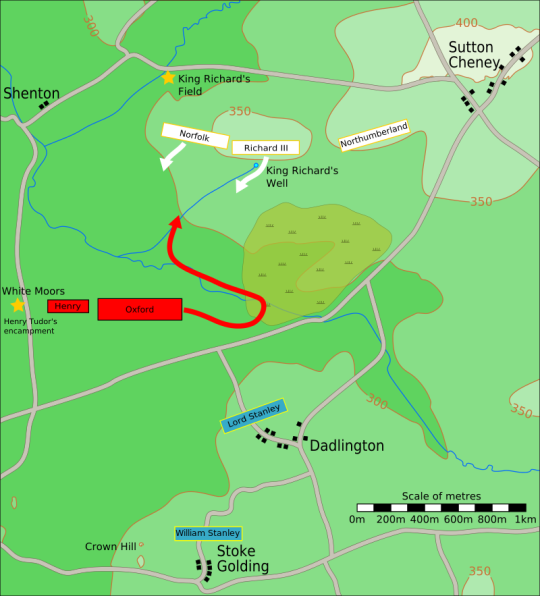
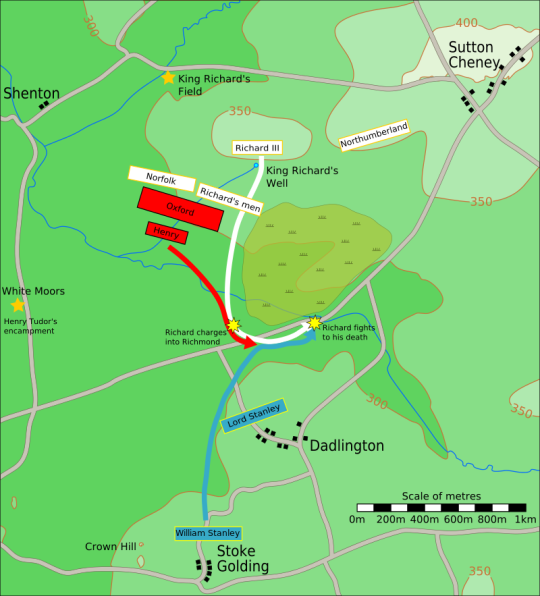
And some things truly are not made clear by it, so I changed it a bit:

I also think it is possible that while Richard charged pass Oxford and rest of Henry’s men, they noted this(his standart, crown on helmet-kind of hard to miss) and deliberately, they moved bit eastward-towards the marsh, to cut him off from rest of his troops. They probably prevented him from retreating same way he came.
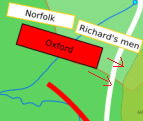
But for that to have happened, it means they couldn’t be that engaged with Norfolk’s men. Perhaps by this point, Norfolk already died and his men were fleeing.Northumberland still couldn’t engage, and Richard probably started to realise, that despite being great warrior himself, Oxford was owning his army.
Whetever or not Richard was as good commander as Oxford or not, no longer mattered because Richard’s strategy relied on 3 flanks, but only 2 could engage and he just lost of one those. So he was left with just one flank of his army.
(Imo the narrative that without Stanley’s engaging into battle, Richard would win, is not true.)
It is probably by this point Richard descended to his men, to arouse them to stay and fight. (Because they’d probably fled if he didn’t). But then he spotted his rival.
(Some say his spies spotted him first, then Richard personally. On google earth if you look from where RIchard would aproximately descent to, and to where Henry was aproximately going, it seems he could have spotted him, himself. There was nothing preventing it(unless the weather was bad), so with good eyesight, Richard could logically assume that some smaller force behind Oxford he could see, was Henry Tudor, even if he couldn’t recognize him from distance.
And even though Lord Stanley would not engage in this battle, it would have looked to Richard as if Henry Tudor was going towards Dadlington, to Lord Stanley.
Henry might have merely go in that direction to see bit better what was going on(it was slightly more up, but enough to see better)-perhaps bit eastward to see where the heck was Northumberland(and if he wasn’t going around the marsh to get into his back), but Richard would have probably believed things were going to get from bad to worse for him.
Some say Richard was also enraged to see Henry’s royal banner, because he considered himself the only King on the battlefield.
But I think it was probably combination of Richard realising he could loose, him getting tired and the rage which all combined and caused him charge at Henry valiantly(meaning with great courage and determination).
I don’t know if he ever said it, but imo he certainly at that point thought that he’d either win or die as a warrior King. Richard was not going to flee. He was going to fight it out.
He took his chance, and he got close to killing Henry Tudor.
Question is what prevented him?
And the easy, and untrue answer would be Sir William Stanley’s men.
It was more complicated than that.
Before I dive into it it’d like to point out that Richard’s primary weapon on horseback would be his lance.(that’d be true for most cavalry men.) Only after he no longer had usable lance, he would take out his secondary weapons-probably war hammer or sword. In documentary about his scoliosis they had Dominic train with sword, but also shown reinactors with other weapons-so I think they don’t actually know which secondary weapon Richard’d prefer. And there’d be way more many to choose from than just sword.
But since portrait from Tudor times shows him with broken sword, I think it is possible, Richard’s secondary weapon of choice was indeed a sword.
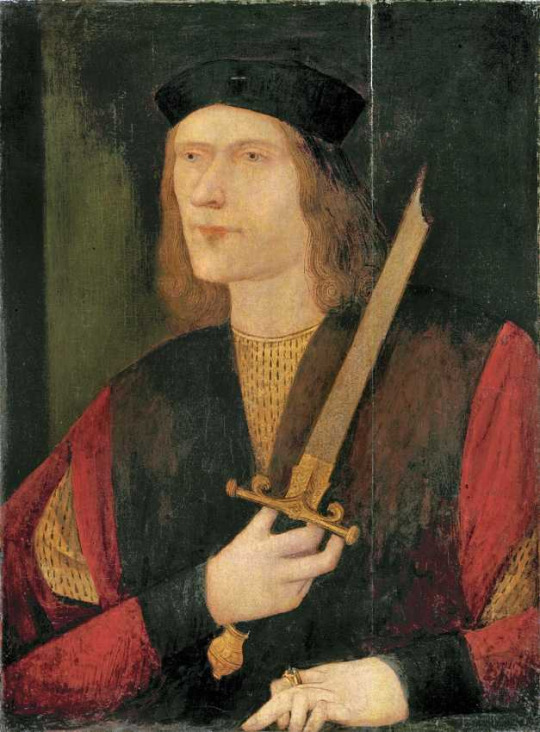
So Richard and his guard charged(Richard with lance in hand, on horseback) toward Henry Tudor and his guards.
So far very logical, and matching the accounts. But then things get murky.
I am not questioning Richard’s bravery or that he indeed got close to killing Henry.
I am questioning what happened when Henry and Richard and their guards clashed. They didn’t just wave around their swords and lances in the air, before Stanleys arrived. They were killing each other!
Imo, the guards deserve way more credit that they’ve been given!
(And way more screen time! These are most interesting parts of the battle and I don’t think they ever got on screen!)
Because Henry’s guards prevented Richard from killing his oponent and deciding the battle in his favour, before arrival of William Stanley’s men.
Richard’s charge(with his men) seems to have took Richmond’s forces by surprise. Idk how, but several things point to that being the case, despite Vergil claiming Henry saw Richard coming. (Seeing him few seconds before his arrival vs few minutes could be big difference!)
Mainly the fact that Oxford left pikemen in Henry’s guard and they didn’t suround their master to protect him from cavalry charge.
Rhys ap Thomas also left men with Tudor and there were also French mercenaries with him. And yet, somehow they didn’t see Richard charging at them.
Probably because Henry’s men were moving in other direction and Richard came from behind them. They didn’t expect him to pass just next to battling forces and separate from his army.
Richard was really determined to get to Henry Tudor and kill him.
With his lance he killed Sir William Brandon(father of Charles Brandon)- Henry’s standart bearer and then with his already broken lance unseated Sir John Cheyne(he knocked him off the horse). That was no small feat.
While documentary about Richard says Cheyne was over 6′ tall, his bones suggest he was aproximately about 6′8′’!!! (How big was his horse?!)
Sir John Cheyne’s tomb(bellow), look at the seize of those legs!

Really huge knight and Richard unhorsed him, as if he was nothing.
He broke off his lance probably completely by this point and probably took out sword to kill Henry Tudor.
But here the accounts warry. What exactly happened, when Richard managed to get through two of Henry bodyguards? Nobody knows truly.
Spanish account says Henry saw Richard comming, and refused to flee, and Richard refused to flee before that.(So both were brave.)
French account say exact opposite. That when Richard came, Henry dismounted his horse and hid behind his men as coward.
Many websites put this French account among ‘facts’ of Bosworth and it is most spoken about.
Which is more likely to be true? Neither!
Imo, all foreign accounts of any battle, are highly unlikely to be true. If it is not by person who was at least once in that country, don’t believe a word! That is what i learned to do when researching battles. Because the bias, It’s unbelievable! Nonsense some foreign chronicles wrote is sometimes making me question whetever or not they know about which battle they are writing about.
And it is even more unbelievable, that people know some of these chroniclers were working for party which was very biased against one side-and they are not bothered by it! (Unless it is Vergil-whose credibility is apparently 0 despite having best chance to meet survivors of Bosworth-from both sides, while living at English court. But tbh, I don’t trust Vergil that much. Because even if he wished to be truthful and indeed based it upon survivors account, those survivors now worked for Tudors and would not say anything against him.)
Basically they believe Chapuys’s of their time-and for record, I am Catherine of Aragon’s fan and I don’t believe a word from Chapuys.
That account of dismounting is clearly propaganda by side supporting Richard/Yorks, because it doesn’t make sense!
Armoured knight had no reason to get off his horse. There is no logical advantage to it! Henry’d actually be better target for Richard if he dismounted! If he had time to make a move and hide-he could move his horse and his men could just as well suround him while he was on that horse.
Me as amateur can see that and people who seriously studied this battle, don’t see anything wrong with that account?!
That account is illogical. It basically claims Henry was not only coward, but also an imbecile!
And imo this account actually is slighting Richard too. Bear in mind, what I am about to say is purely my theory. Not supported by anything. OK? So don’t claim it is a fact, because I might be completely wrong about it!
But if Richard’s charge was indeed big surprise and he fought so valiantly, imo, it’s possible that after getting through two of Henry’s knights, he got to Henry.
He got close enough to kill and maybe Henry had no time to hide! Even if he wanted to. Only to ready himself to face the more experienced warrior.
He wasn’t experienced enough to fight Richard off imo.
But in full armour, both on horseback, perhaps he managed to at least defend himself for few crucial seconds.
It is purely my theory-but dent in Henry’s right cheek could have been from battlewound. Perhaps from Bosworth. Perhaps from Richard himself.
Richard could try to stab him through gap in helmet. In full armour this could be the most exposed place.
If the helmet was not completely covering Henry’s face or if he had part of it up(which commanders did sometimes to see better) and not have enough time to put it down. It’s possible.
By the way despite coming with this theory before reading Vergil’s account, I seem to agree with what he wrote:
‘But yet Henry abode the brunt far longer than ever his own soldiers would have weened’ (ween meaning think or suppose). Virgil doesn’t directly say Henry and Richard exchanged the blows, but I think they might have. Or at least Henry defending himself while Richard kept attacking.
Somehow Henry, managed to block Richard’s blows, at least partially-gaining that dent in right cheek. And here can be explanation of why Henry dismounted-despite it being absolutely illogical.
Maybe one of the diverted blows hit Henry’s horse. Maybe seriously wounded the animal or even killed it. Henry had no choice but to dismount.
I don’t know if he managed to jump off while animal collapsed or if he got pinned beneath it(even if for just partially).
His horse being done for is only logical reason why he’d dismount, and then it’d be only logical for his men to suround him.
You’d not separate if you don’t have to, during battle, because you’re rather have your back protected by your fellow men, and just focus on fighting enemy on one side. So Henry Tudor would stay among his men.
As footsoldier, Henry couldn’t fight in same capacity as cavalry man and it was most logical if he stood shoulder to shoulder with them, them keeping tight formation.
If he was pinned under the horse, then perhaps they actually did suround him, to protect him, they basically hid him behind them.
(Which would meet the French report, although-not be account of Henry’s cowardice, but rather Richard’s valor and strenght-if he managed to kill or cripple the horse, possibly with just one blow.)
But Richard now faced a problem.
Sir Cheyne’s charge, him putting himself between Richard and Richmond, bought those men few more seconds to react. Richard’s attack lost both moment of surprise and momentum, while he was taking care of Sir Cheyne and he didn’t manage to kill Tudor despite being so close to doing so. And now all of Tudor’s guards were ready to face Richard’s.
It was on!
And William Stanley’s men were quickly aproaching.
Even if Richard wished to try to return to his army, the closest path was now blocked. He could try to go around the marsh towards east and perhaps try to join Northumberland.
(This would not be act of cowardice, but tactical retreat. It happens in battles.)
Potentially Richard’s men faced another issue.
Because perhaps Sir Cheyne was only stunned momentarally. Or not at all. Man of that size and reputable strenght picking himself up fast and attacking from their back! Not good scenario for Richard’s men, though not found in historical records. But certainly my pick on how potentially Richard’s standard bearer lost use of both his legs. Sir Cheyne crushing them both with one blow and cutting through Richard’s men, one by one.
But you might think-that is impossible because that standard bearer is supposed to be with Richard, when he died. And Richard died hundreds of feet from where he clashed with Henry, pushed there by enemy forces! But that is not proven to have happened and it is highly unlikely scenario.
He could be pushed many feet away, but several hundred? No!

He might have disappeared from sight of Richmond, but he certainly was not hundreds of feet away where he died. If I am not mistaken, it was brooch found on the site at that place, which sparked the theory that Richard died so far away.
But that brooch could have belonged to his supporter, who fled. Or perhaps fell of pocket of anybody who looted the dead of the battle.
Stanleys arrival didn’t save Henry directly from Richard’s own attack, but it certainly saved lives of many of his men, and improved their morals thousand times. With newly found vigor, Oxford’s pikemen, welshmen, french mercenaries, Stanleys and other attacked.
It’s likely that as soon as they could, they pushed Richard’s forces towards the marsh-knowing it’d be difficult terrain for them.
(Still close to where two rivals clashed.)
Richard’s men fell one by one, killed by Tudor forces. His own horse got stuck in the marsh.
I don’t believe that ‘Kindom for horse’ happened. But I think given Richard’s scolliosis and him tiring up more easily, he’d have disadvantage on foot. He would wish to be back on horseback, where he had better chance of surviving. So perhaps he indeed asked for horse. It’d be logical for him to do so.
Richard died in thick of his enemies, killed by many blows.
Henry Tudor's first Royal Proclamation, dated 22-3 August 1485, stated Richard III was killed at a place called Sandeford. There is heated debate where exactly that is. In 1858 James Hollings identified 'Sandeford' as the point where the present Shenton to Sutton Cheney road passes over a watercourse that flows from Market Bosworth. Part of the road which crossed the ford was apparently known as 'the Sand Road' - so-called because the inhabitants of Shenton used to traverse it when exercising their ancient right to take sand free from the north side of Ambion Hill - and on this basis it has been assumed that the water crossing was 'the Sand ford'.
Problem is, sometimes stream’s move a bit(even big river can do that), so it is likely that Richard died somewhere near the road and stream, close to the marsh.
If the stream was going bit more south than nowadays in 1485, that basically leaves us with really big section around the road:

Who exactly killed Richard is uncertain, although Molinet’s account and poem by Welsh poet say or suggest it was Welshmen-probably one of men of Rhys ap Thomas. Which is entirely possible given he put many men to Tudor cause.
But it is also possible if not likely, it was not just one man who killed Richard but multiple. King Richard's body shows that the skeleton had 11 wounds, eight of them to the skull, clearly inflicted in battle and suggesting he had lost his helmet.
He was last English King to die in battle, and truly died a warrior’s death.
While his body was then paraded around in Leicester to prove he was truly dead, he wasn’t buried dishonorably as being found in car park would suggest. He was buried in Greyfriars Church, which didn’t survive Dissolution of monasteries.
It is said Henry VII paid 50 pounds for momunent(for Richard’s tomb) in 1495. No small amount at those days.
This might seem strange to us that he paid for tomb of his rival, but imo it could be good move for propaganda, especially if it also depicted Richard with broken sword.
Richard is currently burried in Leicester Cathedral and tbh I hate how modern his monument looks:
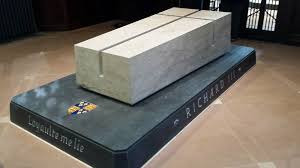
But at least he is buried properly.
Too bad his nephews were not given same honour.
So that was bit of shade at the end, I hope you’ve enjoyed it.
11 notes
·
View notes
Text
2017 : a rant
I never share this story for the pity sad looks or even the unbearably tight hugs. I really hate it. In fact i hardly share the exact story. The most you'll know is su got raped and kidnapped once upon a time. There was a point when i thought id be a survivor, not go off the deep end. Statistic and Su would never be in the same sentence. But reality check, it is. I am a number in an article about the woman and children who were raped in 2008 or whatever time period will suit the writer's expectations/opinions. Have i let it define me? In some ways yes. Yes i have. Its what keeps me up at night when i cant sleep. What makes me wonder whether i want to bring life to a world with so much evil. 2017 has seen many people kidnapped and raped. I say people because its not just violence against women and children. Its violence against everyone. I keep asking the question, whose idea was this? To raise the amount of people being violated in just a few months? I mean february just started. Whose idea was it to do this? And why? For heavens sake why? Whats so wrong with our country that this is what people resort to? Being kidnapped is a worse fate than being killed. In my humble opinion anyway. To feel so threatened that you never want to step out your house again is scary, especially when you thought you were safe this entire time. That you were somehow sheilded from the evils of the world. Then you wake up one day and it turns out youre not. Youre just as vunerable as the persons you see on tv, the missing persons reports you so deligently retweet or repost on your social media pages. My question has always been this. What can we do to ensure it never happens? Nothing. Nothing at all. You can just try really hard to ensure it doesnt happen to you and even then are you really safe? What has happened in our society that some men think this is okay? That this is acceptable? How can you possibly change the outlook of an entire nation? Why are we so ready to accept when persons make rape jokes? Why do we use such serious words to try to describe an experience? Especially when the possibility of other words to convey our emotions exist? Why would you say "this exam rape me"? Why would you liken the traumatic experience of many around you, some who you may not even be aware of to something so...trivial in comparison? Social media has a way of making us feel like we're being activists when we really aren't. Putting on a specific colour shirt to show that you stand with victims/survivors does not do as much as you think. Outside of the fact that the "movement" would have to be known to the general population, seeing that stand for one day isnt going to prompt a victim to want to talk about it or relive the experience. Personally for me it makes me upset. Why? Because alot of it is just for show. How many people remeber about the cause after the day is gone? How many people will actually back up their talk? How many of those same people have made jokes about being raped? The questions go on. Point is. Dont be so naive to think that your one day in black will give a victim the help they need. People claim to want to be there, to want to listen but hardly follow through. There's so many other ways to help. So many other things that wont just look like a photo op to the populace. If you want to effect change, be that change. Some people consider it an act of bravery to share your story. Does that mean not sharing it makes you a coward? I dont know but i do know that im terrified to even think about the events of that day let alone share them in detail.Not saying a few havent heard the full details, they have, and every time i tell it i have to steel myself and pretend it doesnt phase me. Because who wants to be a blubbering mess?
3 notes
·
View notes